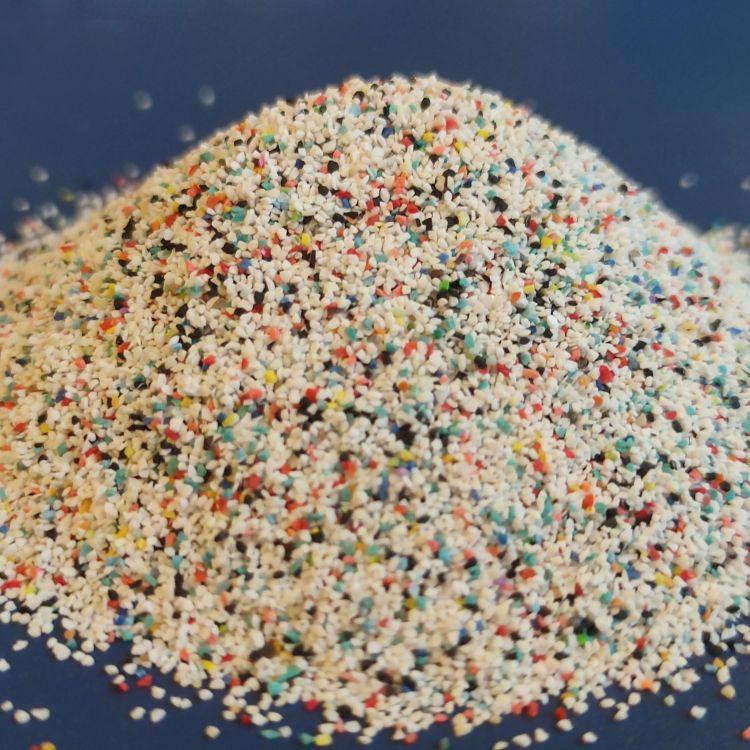Plastic Resin sand, especially furan resin sand, is widely used in the foundry industry due to its superior properties. The following are some specific application case analyses:
Advantages of resin sand
Casting quality: Resin sand castings have smooth surfaces, clear edges and corners, and high dimensional accuracy. Compared with traditional clay baking sand, resin sand can improve the geometric dimensional accuracy of castings, reaching CT7-9 level, and the surface roughness is significantly improved.
Production efficiency: After using resin sand, production efficiency can be increased by 40% to 100%, and the output per unit modeling area can be increased by 20% to 50%. This efficiency improvement is mainly due to the good fluidity of resin sand, which does not require an additional tamping machine for compaction, thus simplifying the modeling operation.

Improved working conditions: The use of resin sand reduces noise and dust pollution, and improves the working environment and working conditions.
Application cases
Automobile industry: In the casting of automobile engines, resin sand mixed with thermosetting resin (such as phenolic resin) is used. This kind of casting mold is widely used in the production of automotive parts with high precision requirements because of its thinness and flat surface.
Production of medium and large castings: In industries such as machine tools, valves, and water pumps, resin sand is widely used in the production of medium and large castings in small batches of various varieties. Due to its superior performance, these industries are at the forefront of the promotion and application of resin sand.
Shell mold casting: A method using resin-coated sand. Molding sand coated with phenolic resin is added to a preheated mold and solidified by heating. This method is widely used in the casting field and can produce casting materials with excellent fluidity and smooth surface.
Recycled sand technology: With the improvement of environmental protection requirements, recycling technology is receiving more and more attention in the application of resin sand. For example, Japan’s Shinto Company uses pressurized friction regeneration technology to effectively reuse old sand, thereby reducing costs and environmental impact.
in conclusion
Resin sand occupies an important position in modern casting technology due to its superior physical and chemical properties. Its successful application in many fields such as automobiles and machinery manufacturing has not only improved product quality but also optimized the production process. With technological advancement and increased environmental awareness, the application prospects of resin sand will be broader in the future.
Main application industries
Foundry industry
Furan resin sand: As the main component of self-hardening sand, furan resin sand is widely used in the foundry industry, especially in the production of automobile and mechanical parts. Its superior formability and high strength significantly improve the surface quality of castings, achieve high dimensional accuracy, and significantly increase production efficiency.
Phenolurethane resin sand: In recent years, this resin has also begun to be used in casting, especially in the production of thin-walled castings, showing good results.
construction industry
Resin sand is used in the production of construction materials such as concrete and precast elements. Its superior adhesion and durability make it an ideal building material additive, capable of improving the overall strength and durability of the structure.
Electronics and electrical industry
In electronic product manufacturing, resin sand is used to produce substrate materials such as copper clad laminates. The properties of these materials directly affect the signal transmission and insulation properties of the circuit board, so the quality requirements for the resin are extremely high.
auto industry
During the casting process of automobile parts, resin sand provides higher precision and better surface finish, meeting the needs of modern automobiles for lightweight and high-performance parts .
Machinery manufacturing
In the production of mechanical equipment, resin sand is used as mold material, and its reusability and processing flexibility make the production process more efficient while reducing material costs.
in conclusion
Resin sand has been widely used in many industries such as foundry, construction, electronics, automobile and machinery manufacturing due to its superior physical and chemical properties. With the development of technology and the increase in market demand, the demand for resin sand in these fields is expected to continue to grow in the future.
